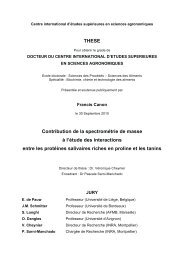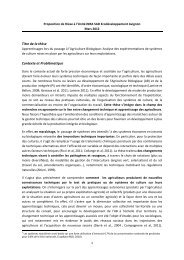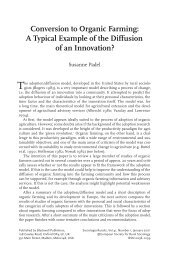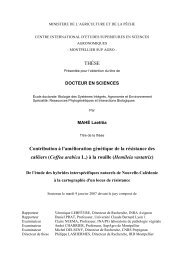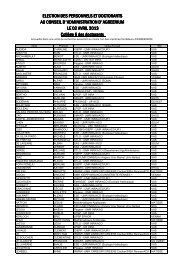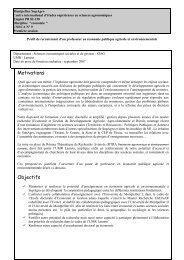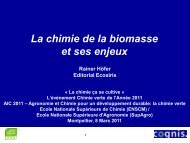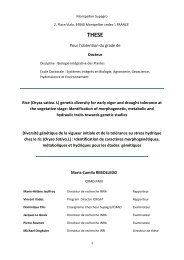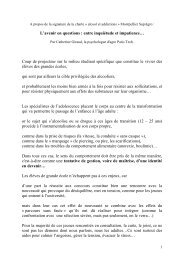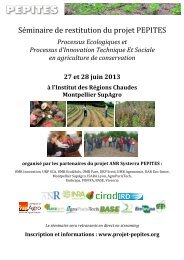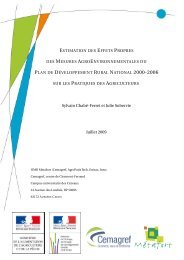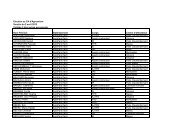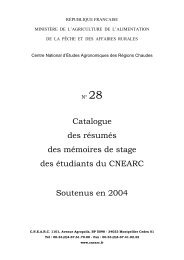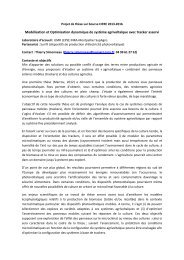CYCLE D'ETUDES SUPERIEURES - Montpellier SupAgro
CYCLE D'ETUDES SUPERIEURES - Montpellier SupAgro
CYCLE D'ETUDES SUPERIEURES - Montpellier SupAgro
You also want an ePaper? Increase the reach of your titles
YUMPU automatically turns print PDFs into web optimized ePapers that Google loves.
Résumé des mémoires de stage des étudiants du CNEARC - soutenus en 2002BIRI KASSOUM Boukari, MAITRE D’HOTEL ElodieContribution à l'étude de la durabilité de l'agriculture familiale en zone de frontpionnier : exemple de la communauté de Benfica en Amazonie orientale brésilienneMémoire ESAT 1-DATBRESIL, AmazonieINSTITUTIONS ASSOCIEES• GROUPE NAJAC• ENSAIAEncadrants : Catherine et Michel GRIMALDI (IRD), Benoît SOURISSEAU (IRD), Mireille DOSSO(CNEARC)RESUMENAJAC is a group of pedologists and agronomists researchers, which studies interactions between agrariansystems and pedologic systems, in order to determine how to use the soil ressource in a sustainable way. Thisstudy corresponds to a demand from NAJAC and shows the current situation of family agriculture in a communityof the Brazilian Amazonian pioneer front. The study was carried out in Benfica, in the south of the Brazilian statecalled Para, 100 km to the west of the city of Maraba, in oriental Amazonia.The community is situated on two physically different areas: one is located on granite (area II), the other one ona granulite type mother rock (area I). The area II was settled in 1990 after the land was bought, while the area Iwas seized in 1996: thus, the history of the land’s occupation is different. Furthermore, the area II decided to gotoward extensive beef-breeding while in the area I, forms of agriculture are much more diversified.The Brazilian government is trying to slow down the evolution of the pioneer front (by limiting deforestation) andcreated production credit-programs in order to promote sustainable forms of agriculture. Thanks to these credits,many producers of the area I have started new activities, like perennial cultures or fish breeding.This study aims to evaluate, among the diversity of the practices recorded, those which go toward a sustainableuse of lots. We decline the sustainability following the four directions determined by Landais, that is to say:reproductibility, viability, vivability, transmissibiilty.The first studies carried out in the Amazonian pioneer front showed that the main evolution was toward a beefbreedingspecialization and concluded on the un-sustainability of this activity for family producers who sell theirland to move in direction of the newest lands of the pioneer front. We especially emphasize on new activities likeperennial plantations and fish breeding which are, in one way, alternatives to beef breeding. It seems that thesustainability of area I involves a diversification of the activities (way of intensification) while the sustainability of thearea II involves good management of the grass (way of extensification).MOTS CLES : Amazonia, Brazil, Maraba, pioneer front, family agriculture, soils, beefbreeding, diversification, sustainability, perennial cultures.AXE DE RECHERCHE : I. DIAGNOSTIC DE SITUATION AGRICOLE A L’ECHELLE D’UNE PETITE REGIONI-1. Systèmes agraires en régions forestières humidesCote documentation CNEARC : 4° 14652- 13 -



